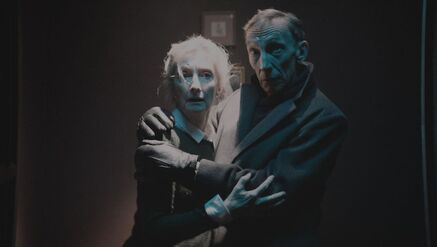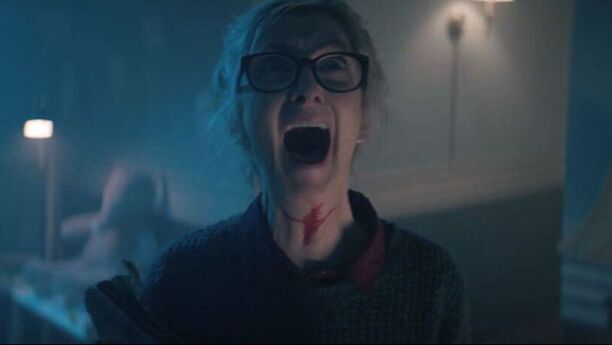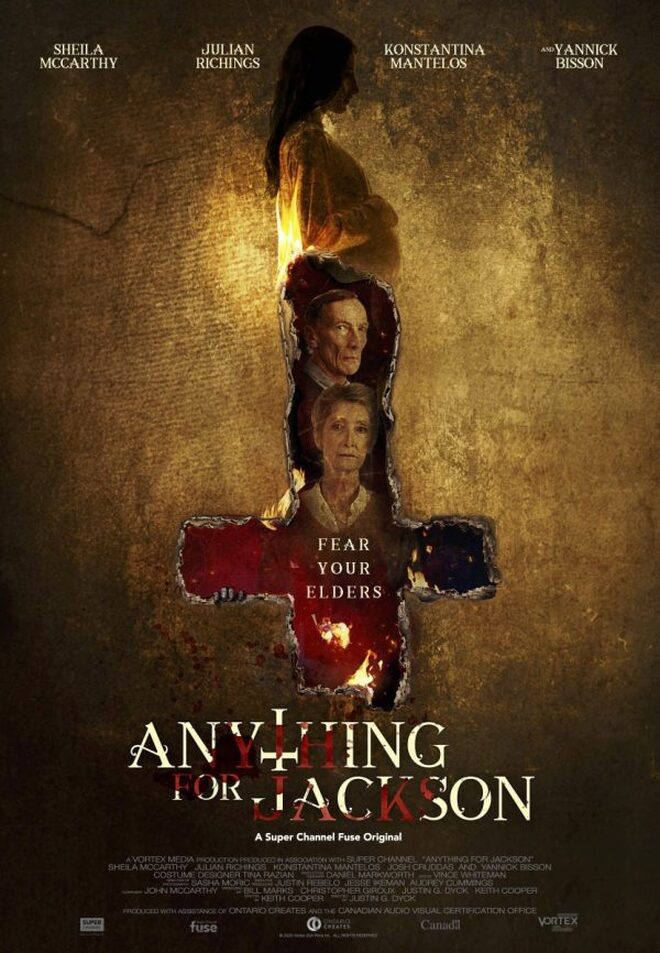 Grief is the birthing ground of horror... ...It’s one of our most complex emotions, expressed in more ways than we could imagine. It’s so powerful it can morph us into entirely new and unrecognizable versions of ourselves or engulf us so completely that it warps our memories and ways of thinking around the moment of trauma. Writer Keith Cooper and director Justin G. Dyck dive into some of the layers of mourning with Anything for Jackson, which is now making its US Premiere at Nightstream Film Fest. Audrey (Sheila McCarthy) and Henry (Julian Richings) are a couple in mourning. They’ve lost their daughter and grandson in a tragic accident. Audrey is so drowning in her sorrow that she’ll go to any length to bring her grandson Jackson (Daxton William Lund) back, even if it means kidnapping and trapping a pregnant woman in order to provide a vessel for Jackson’s return. What follows is, of course, the opening of a doorway they have no idea how to close, and more havoc than they know how to handle. The film’s opening and atmosphere is an exercise in Lynchian domesticity. It seems so innocuous, Audrey making dinner and cleaning the kitchen while her husband sits eating. We know what we’re here for, though, and something about the cinematography sets us off that things are not quite what they seem. There’s a sinister tension lingering just underneath reminiscent of David Lynch’s Twin Peaks or Rabbits. Sure enough, within the first ten minutes our story is off to the races, with pregnant Shannon Becker (Konstantina Mantelos) tied up in a soundproof room while Audrey handcuffs her to the bed, promising nothing bad will happen to her, but that they’ve thought of everything so there’s no point in her attempted escape. “No one has more time than a grieving family,” Audrey tells Becker while setting the plan in motion intended to prevent anyone from looking for their victim. And we get the sense that she’s right. Time, for this couple and for Audrey in particular, seems to have stretched into one endless length of suffering. Henry seems to want the plan to succeed, but his motivations have less to do with reanimating the lost and more to do with protecting Audrey. They may be a couple of kidnapping Satanists out to perform rituals they don’t fully comprehend, but Henry and Audrey are also very much in a lived-in kind of love. He knows what he has to do to make sure Audrey doesn’t fall apart completely under the burden of her loss, even if that means using his patients as vessels for the damned. Anything for Jackson is, above all else, soaked in tragedy. It feels like it’s trying to be a horror-comedy, and it has its moments of levity, but the prevailing effect is one of mourning and fear. Audrey and Henry are a family haunted by their loss and floundering for a connection to loved ones lost. They are a perfect case study of how far people unable to heal from a loss will go to try and undo it, and how far we’re willing to go for the ones we love. Too grieved to fully think through the consequences of opening their gateway, they find more than they bargained for on the other side. Where they wanted Jackson, they got a whole array of tortured souls in search of hosts—and none of them are picky. Ritual be damned, the damned will walk the earth. These manifestations are where the film’s effects really shine. The creatures are brought to life either by way of practical effects or genuine body horror. The standout is by far Troy James as the Suffocating Ghost, who first appears emerging from under Becker’s bed like a nightmare made flesh, contorting in impossible ways. His ability to contort his body remains unparalleled and always unsettling; pair it with his smothered breathing and you’ve got the perfect performance of a mindless and tortured soul. The portal, more than opening the way for the lost and the damned, creates an avenue for them to take residence in anyone who happens to come close enough to the Walsh property. They seem to reveal each new guest’s most deeply hidden trauma, and exploit it so their hosts are just as doomed to an existence of gruesome torture and visually shocking gore as they were before breaking back into the land of the living. Beyond Jackson’s casual and shocking violence, the story is rooted in some heartfelt and vulnerable performances that invite our sympathies for almost everyone involved. Richings’ Henry brings his emotional torture to the forefront. We know he isn’t as keen on the plan as Audrey from the get-go, but his love for her is just as apparent as his internal struggle with the ritual. He is, aside from the demons themselves, my favorite performance on offer. I have barely scratched the surface of the story, but the standout of this film is by and large the aesthetic. The feel of it is what draws you in. The normalcy tinged with the unnatural most comfortable in a David Lynch work has found a home in the hands and minds of Dyck and company. Check it out if you get the chance, I think it may surprise you. By Katelyn Nelson Enjoy Katelyn's writing? Leave her a tip here through Ko-fi!
0 Comments
Leave a Reply. |
Archives
March 2023
|



 RSS Feed
RSS Feed